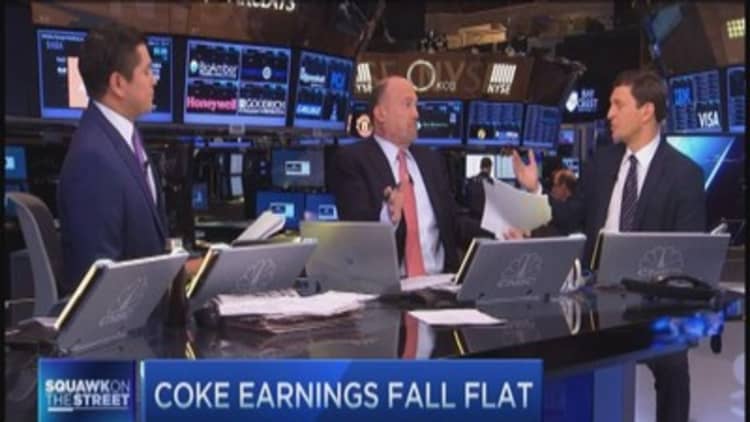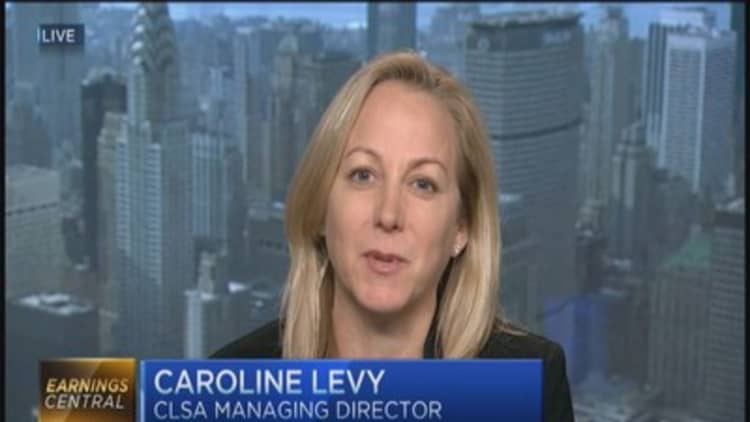
Tuesday's results from Coca-Cola were enough to make some investors queasy. That should be a cue to start reading the ingredients more closely.
Coca-Cola shares fell 6 percent Tuesday after the company announced disappointing third-quarter results and lowered its long-term sales outlook. The company now expects to generate mid-single-digit annual revenue growth through 2020, a slight decline from the previous target of 5 percent to 6 percent.
That revision may have surprised some investors who look at Coca-Cola as a rock-solid investment. After all, the company is Warren Buffett's second-largest holding and the Coca-Cola brand is one of the most recognizable in the world. Conventional wisdom suggests the company will ride out any short-term weakness.
Read MoreWarren Buffett just lost ANOTHER $1B on this
But anyone watching the company's fundamentals would have noticed hints of problems that could last. For the last couple of years, Wall Street estimates have declined steadily. At the start of 2013, analysts expected Coca-Cola to generate $57 billion of sales in 2015, versus $48 billion today.
While some of that decline was due to uncontrollable factors such as emerging-markets weakness and foreign exchange, other problems may be more structural than cyclical.
Read MoreCoke is not a well-run company, says Cramer
Take the decline in diet soda sales. Domestic unit volume of Diet Coke, the company's second most-important drink after Coca-Cola, fell almost 7 percent in 2013, according to Beverage Digest. On an investor call Tuesday, Coca-Cola CEO Muhtar Kent acknowledged the company has "more work" to do in the diet category.
And Coca-Cola has made investments that betray a sense of urgency. In August, it invested $2.15 billion in energy-drink maker Monster Beverage. Had Coca-Cola not made that deal, there was a chance Anheuser-Busch InBev or PepsiCo would swoop it up and cancel Coca-Cola's existing distribution deal with the energy drink company.

Coca-Cola continues to look for ways to keep profit growth on track. The company announced plans Tuesday to refranchise most of its bottling territories by the end of 2017. A capital-light model should help the company in the long run.
The company also said Tuesday that it would implement a cost-cutting program designed to achieve $3 billion in annualized savings by 2019. But the benefit may be smaller than it first appears. J.P. Morgan analyst John Faucher points out that some of the cost savings will be reinvested, so it's unclear how much will fall to the bottom line. And the $3 billion figure includes a $1 billion program that was previously announced, so only $2 billion is incremental.
Read MoreA choice of a new generation? Pepsi tries stevia
Despite its troubles, Coca-Cola stock commands a premium valuation. Coca-Cola trades at 19-times forward earnings and has an enterprise value of 14.6-times earnings before interest, taxes depreciation and amortization. By both measures, the stock is close to its richest level since the financial crisis.
What's supporting the stock? Some investors say there's a chance of an activist driving major change at the company. There's also speculation that another large beverage company could swoop in and buy Coca-Cola in a massive takeover. (Coca-Cola declined to comment.)
But those probably aren't good reasons for most investors to park money in the stock. Investors waiting for Coca-Cola's fundamentals to turn around will need strong stomachs.


